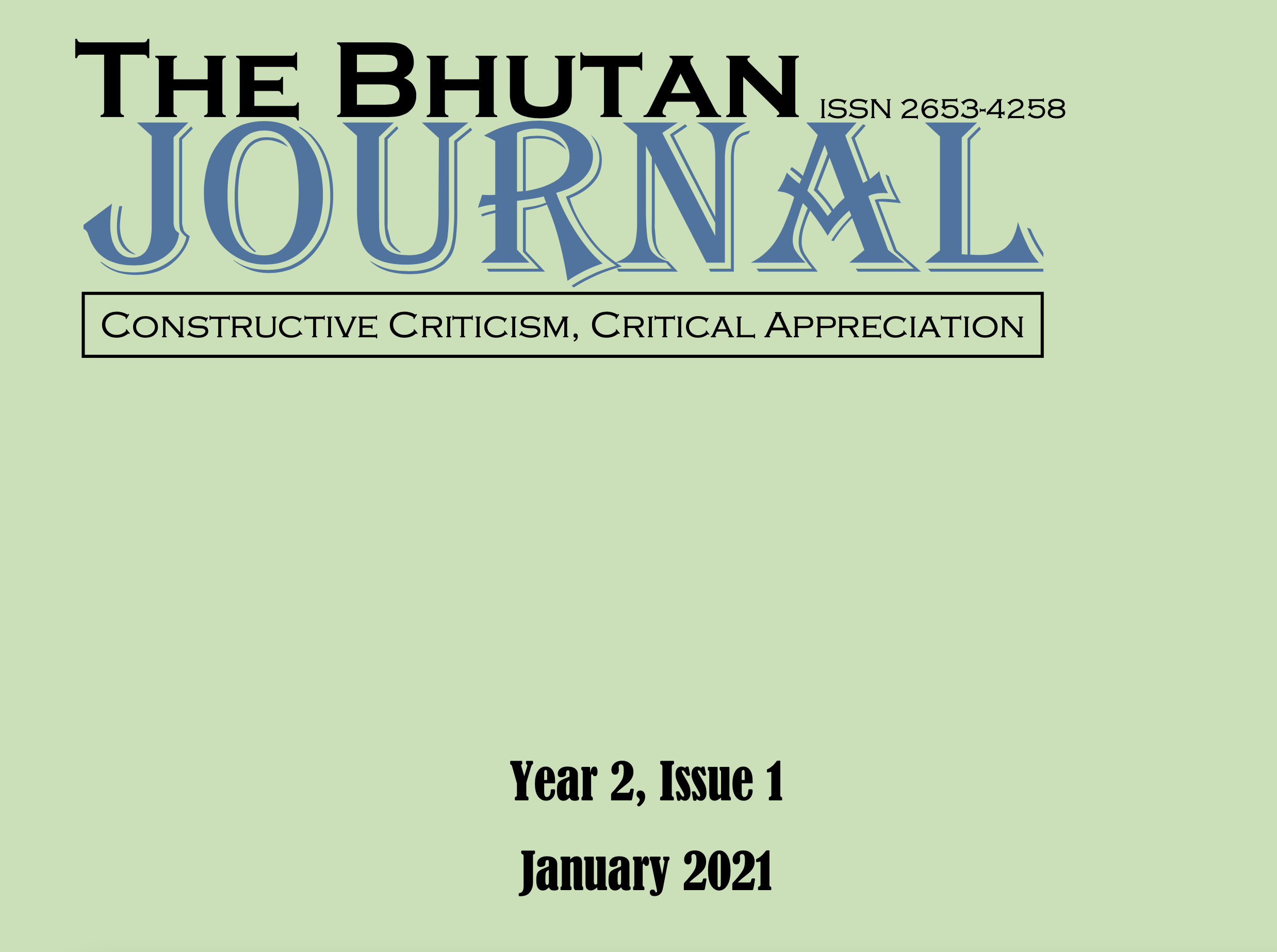This issue also carries many grievances of the past and the agony of unsolved issues. This journal like the first one also carries sentiments and contents of Bhutanese diaspora more than Bhutan.
By Dr Govinda Rizal
Formed on the principle of volunteerism, the Orange Army is dedicated to crowd control, rescue and operation during emergencies, takes up the role of alert citizens. The Orange Army is now running a parallel government and is growing incredibly popular among the citizens most of whom are not happy with the democratic parliamentary system in the country and victims of calamities.
Citation: Rizal, G. (2021). De-Suung: The Orange Army. The Bhutan Journal, 2(1), pp 3-19. Bhutan Watch
Democracy, Adult Franchise, and Public Participation
By I P Adhikari
Bhutan promotes adult franchise, conducts periodic elections and has elected parliament and government. It has political parties contesting elections. But it lacks accountability mechanisms, participatory channels, independent and active civil societies, democracy education, and monitoring system that are central to a functional democracy.
Citation: Adhikari, I. (2021). Democracy, Adult Franchise and Public Participation. The Bhutan Journal, 2(1), pp 20-38. Bhutan Watch
Integration and Satisfaction Among Resettled Bhutanese in Australia
By Prof Dr Manfred Ringhofer
Forcefully evicted out of country, 20% of the Bhutan’s Lhotshampa population spent decades in refugee camps in eastern Nepal. Now they are resettled in developed countries and are starting a new life. They are happy. They have embraced their new country and connection with Bhutan is gradually eroding.
Citation: Ringhofer, M. (2021). Integration and Satisfaction Among Resettled Bhutanese in Australia. The Bhutan Journal, 2(1), pp 39-58. Bhutan Watch
Bhutanese Settlement and Community Leadership
By Om Dhungel
Refugee resettlement provides opportunities for key stakeholders to work more collaboratively by adopting strength-based approaches in driving positive settlement as well as successful integration outcomes. The focus of this article is on learnings from the Bhutanese refugee settlement experiences in different settlement countries and the role community leaders can play.
Citation: Dhungel, O. (2021). Bhutanese Settlement and Community Leadership. The Bhutan Journal, 2(1), pp 59-72. Bhutan Watch
Bhutanese Refugee Cultural Complex: An Outsider-Insider’s Perspective
By Dr Susan Banki
The proposed Bhutanese Refugee Cultural Complex in Jhapa in eastern Nepal is worth asking about its purpose(s). Such commemorative structures are used for documenting history, preventing future problem events, reconciliation, individual healing, and tourism.
Citation: Banki, S. (2021). Bhutanese refugee Cultural Complex: An Outsider-Insider Perspective. The Bhutan Journal, 2(1), pp 73-83. Bhutan Watch
Democracy and Political Prisoners in Bhutan
By Ram Karki
Everyone said Bhutan attained democracy in 2008. King agreed for it. But Bhutan is the only democracy in the world where pro-democracy activists are still serving jail sentences. International community remain mute spectator to the sugar-coated Bhutanese democracy. Bhutan fooled them by taking advantage of their interest on geopolitics.
Citation: Karki, R. (2021). Democracy and Political Prisoners in Bhutan. The Bhutan Journal, 2(1), pp 84-94. Bhutan Watch
Refugees Longing for Repatriation Anticipate Permanent Persuaders
By Dr Taralal Shrestha and Dr Bidhya Shrestha
With the deadlock of repatriation, resettlement came to be the only practical solution to most of the Bhutanese refugees, which weakened the repatriation movement in the sense both local integration and third-country resettlement couldn’t be a durable solution. Repatriation is not just a physical return to ‘home’ but a complex political process.
Citation: Shrestha, T; Shrestha, B. (2020). Refugees longing for repatriation anticipate permanent persuaders. The Bhutan Journal, 2(1); 95-105.
Bhutanese Refugees: Past, Present and Future
By Pro Dr Michael Hutt
Interview with Pro Dr Michael Hutt about the Bhutanese refugee issue, his engagement, future of Bhutanese refugee issue and Bhutan’s democracy and human rights movement.
Citation: Hutt, M. (2021). Bhutanese Refugees: Past, Present and Future (Govinda Rizal & Indra Adhikari, Interviewer). The Bhutan Journal, 2(1), pp 106-111. Bhutan Watch
If you want to read Bhutan Journal in print format, download here

One thought on “The Bhutan Journal 2.1”
Comments are closed.